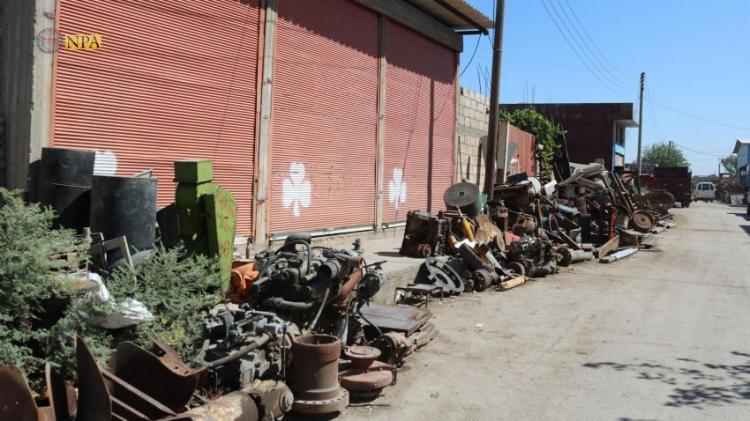Qamishli – North-Press Agency
Ibrahim Ibrahimi
Piles of stacked iron can be seen in front of the iron workshops in the industrial area in the city of Qamishli, which are remnants of broken machines, piles of iron and other metals in the yard of scrap iron shops which are waiting for melting and recycling.
Hussein Muhammad, who is a scrap iron trader complains about the lack of space because the Autonomous Administration has decided to ban the export of scrap iron out of its areas.
“We buy scrap iron from the villagers and from the industrial area, and the stacked iron bothers people and cars, we demand the establishing of a melting plant in order to benefit both we and the Administration, and to keep the city clean”, trader Hussein Muhammad told North-Press.
While some of the exporting traders buy a small part of iron and metal of s
crap shops, but the shop owners haven’t confirmed to which direction they export them, “We don’t know where they take the iron and the metal they buy,” said Muhammad.
Metal prices
The trader buys one kilogram of scrap iron from the roving sellers for 8 SYP, while the clean iron is purchased for 10 SYP and it is sold to the exporting traders for 12 SYP per kilo.
After purchasing, the metals are being sorted, where the scrap trader buys one kilogram of aluminum for 160 SYP and sells it to the exporting traders for 200 SYP.
Traders also buy one kilogram of copper from roving sellers for 1.150 SYP and sell it to the exporting traders for 1.350 SYP.
Primitive Initiatives
Some traders in the industrial area in Qamishli have opened small and primitive melting furnaces in order to melt light metals such as aluminum. So, the trader buys carbonated beverage cans and other wastes which contain aluminum from the roving sellers and melt them in primitive melting furnaces, then poured them into molds in the form of ingots where each one of them weighs from 3 to 4 kg of pure aluminum.
The melter Ahmad Fayyad, who works in one of the small primitive furnaces told North-Press that they melt aluminum cans in the furnace, so “it produces impurities and pure aluminum”.
The melting furnaces are located in the industrial area which are close to the places of residence, which causes environmental pollution and damage to the surrounding areas due to the gases emitted from melting metals, according to the owners of the shops adjacent to the furnaces.
While the scrap traders in the industrial area in Qamishli have assured to North-Press that “tin compression plants were stopped in Qamishli because of the export ban, causing material damage and environmental pollution”, as they said.
Projects of Chamber of Industry
The Chamber of Industry in the areas of north and east of Syria, which is based in the city of Qamishli plans to relocate the industrial area in Qamishli into another place which is designated by the Chamber.
The trader’s name is registered in the Chamber of Industry according to the industrial register and to possessing a shop in the industrial area in Qamishli in order to get a place in the new industrial area project, and the registry of 256 industrial men have been issued so far.
Regarding the fate of the scrap iron which is piled in the industrial area in Qamishli, the co-chair of the Chamber of Industry in the city of Qamishli, Nawroz Ibrahim told North-Press that they are working to transfer the scrap iron to the new industrial area, and that “we are about to open a melting plant”.
The industrial area in the city of Qamishli is the largest one in north and east of Syria, where they are being visited by the owners of machineries from lots of cities, which forms a crisis in the industrial market, and an increase in the pieces of broken iron and scrap metal.
In the end, the traders will keep hoping of consuming the scrap iron and piled metals and will wait for the Chamber of Industry in carrying out projects by transferring the industrial area to its new place and opening the melting plants.

